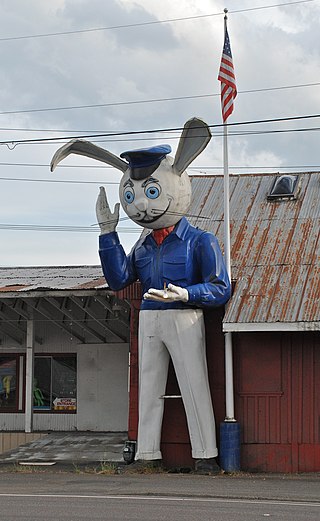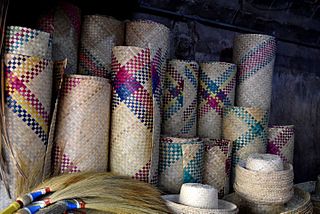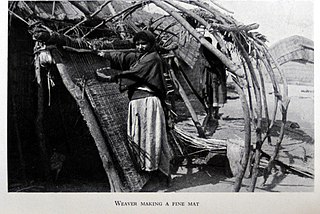Reed mat is a type of lath material provided in a roll.
Reed mat is a type of lath material provided in a roll.

A Mudhif is a traditional reed house made by the Ahwari people in the swamps of southern Iraq. In the traditional Ahwari way of living, houses are constructed from reeds harvested from the marshes where they live. A mudhif is a large ceremonial house, paid for and maintained by a local sheik, for use by guests or as a gathering place for weddings, funerals, etc.

Phragmites is a genus of four species of large perennial reed grasses found in wetlands throughout temperate and tropical regions of the world.

The Kodokan Judo Institute (公益財団法人講道館), or Kōdōkan (講道館), is the headquarters of the worldwide judo community. The kōdōkan was founded in 1882 by Kanō Jigorō, the founder of judo, and is now an eight-story building in Tokyo.

Schoenoplectus acutus, called tule, common tule, hardstem tule, tule rush, hardstem bulrush, or viscid bulrush, is a giant species of sedge in the plant family Cyperaceae, native to freshwater marshes all over North America. The common name derives from the Nāhuatl word tōllin, and it was first applied by the early settlers from New Spain who recognized the marsh plants in the Central Valley of California as similar to those in the marshes around Mexico City.
Annika Louise Reeder is a retired British artistic gymnast. She was the first gymnast from Great Britain to compete in two Olympic Games, in 1996 and 2000.

Bird stones are prehistoric, abstract stone carvings made by Native Americans. The artifacts were a common inclusion in graves and thought to have ceremonial importance. They are noted for their distinctive simplicity and beauty. They first appeared in the middle Archaic period around 5,000 years ago and continued into the early Woodland period to about 2,500 years before present.

Live In Italy is an album by Lou Reed recorded live over two nights in September 1983 using the Rolling Stones Mobile Unit. It was issued on vinyl only in Germany, the United Kingdom and Japan. At the time, Reed and his band were on a world tour to promote the album Legendary Hearts. A live video, A Night with Lou Reed, filmed at a New York concert, was also released to coincide with the album. The video omitted the songs "Betrayed", "Sally Can't Dance", "Average Guy" and "Some Kinda Love"/"Sister Ray" from the 10th show, while adding "Don't Talk to Me About Work", "Women", "Turn Out the Light" and "New Age" from the 7th.
Musiri is a municipality and Taluk in the Tiruchirappalli district in the Indian state of Tamil Nadu. It has an average elevation of 82 metres (269 feet).
Reed mat may refer to:

Kaipen is a Laotian snack made of fresh water green algae, garlic, vegetables, and sesame seeds.

Reedville is an unincorporated community in Washington County, Oregon, United States, located between Hillsboro and Aloha. Oregon Route 8 runs through the area. The community is served by the Hillsboro School District, with some portions of the area within the city limits of Hillsboro.

Straw wine, or raisin wine, is a wine made from grapes that have been dried off the vine to concentrate their juice. Under the classic method, after a careful hand harvest, selected bunches of ripe grapes will be laid out on mats in full sun.. This drying will probably be done on well exposed terraces somewhere near the wine press and the drying process will take around a week or longer. Small scale productions were laid out on flat roofs; however, if this still happens, it is extremely rare nowadays.

A baníg is a traditional handwoven mat of the Philippines predominantly used as a sleeping mat or a floor mat. Depending on the region of the Philippines, the mat is made of buri (palm), pandanus or reed leaves. The leaves are dried, usually dyed, then cut into strips and woven into mats, which may be plain or intricate.
Reed mats are handmade mats of plaited reed or other plant material.

Al-Salihiyya was a Palestinian Arab village populated by people traditionally associated with the Ghawarna, a generic exonym denoting inhabitants of the drainage plains of the Hula Valley. It was depopulated during the 1948 War on May 25, 1948, by the Israeli Palmach. It was located in the Safad Subdistrict, 25 km northeast of Safad, at the intersection of the Jordan River and Wadi Tur'an.
Pathamadai or Pattamadai is a special grade town panchayath in Tirunelveli district in the Indian state of Tamil Nadu.
The Twa of the Kafue Flats wetlands of Zambia are one of several fishing and hunter-gatherer castes living in a patron-client relationship with farming Bantu peoples across central and southern Africa.
A woven mat is a type of mat that is created by weaving and may include:

Madurkathi mats, or madur, are mats woven in West Bengal from a reed called madur kottir, or madurkathi, a sedge of the family Cyperaceae. Madur mat-making is a long-standing tradition, centred on the Medinipur district, and is an important part of the rural economy. The mats are woven mainly by weavers of the Mahishya caste, and predominantly by women. This cottage industry contributes significantly to village household income.
A Cambodian mat also known as a kantael is a woven mat made from palm or reed in Cambodia. The Cambodian mat consists of an ordinary mat, below which are fixed pads of strongly packed cotton, with the help of a special loom. They are specific to the Khmer people.